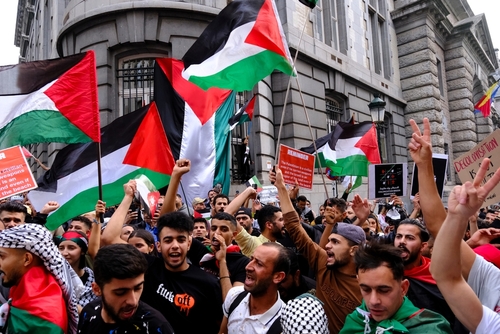
Pence SLAMS Trump Speech – “Disservice to Veterans”!
Mike Pence calls out former President Trump’s Saudi Arabia speech, claiming it disrespected veterans and undermined America’s military efforts.
At a Glance
- Mike Pence criticized Trump’s Saudi speech as a “disservice” to veterans.
- Trump denounced U.S. Middle East interventions, praising local development.
- Trump condemned “nation-builders” for misunderstanding foreign societies.
- Pence opposed Trump’s critique of America on foreign soil.
Pence Takes a Firm Stand
Mike Pence has voiced his disapproval of former President Trump’s recent comments made during his stop in Saudi Arabia. Pence criticized the remarks as disrespectful to veterans, claiming they jeopardized the integrity of U.S. military efforts abroad. He particularly noted the troubling implications of questioning America’s global war on terror in a nation so closely linked with the origins of 9/11. Pence viewed the comments as disparaging to those who served in Iraq and Afghanistan.
Pence’s concern stems from Trump’s denunciation of past U.S. foreign interventions in the Middle East. During his speech, Trump credited the rise of modern cities like Riyadh and Abu Dhabi to local efforts, decrying the American “nation-builders” who, he claims, did more harm than good in regions they did not comprehend. Pence found these comments unsettling, especially when delivered in Saudi Arabia, given its connection to the 9/11 attackers.
Trump’s Critique on Foreign Soil
Trump’s speech formed part of a multi-day trip to the Middle East, with stops in Saudi Arabia, Qatar, and the UAE, but notably excluding Israel. Trump criticized “nation-builders,” “neo-cons,” and “liberal non-profits” for failing to develop cities like Kabul and Baghdad during the war on terror. Despite seeing economic benefits in parts of the trip, Pence opposed criticizing America’s policies on foreign ground, labeling it as a “disservice” to past servicemembers.
“But, Kristen, I’ve never been a fan of American presidents criticizing America on foreign soil,” he said. “And to have the president in Saudi Arabia questioning America’s global war on terror, and describing it as nation-building and interventionist, I thought was a disservice to generations of Americans who wore the uniform and who took the fight to our enemy, you know, in Afghanistan and in Iraq. And particularly giving that speech in Saudi Arabia, where 15 of the 19 9/11 hijackers hailed from, not including Osama bin Laden, I thought was unfortunate.” – Mike Pence.
Trump’s rhetoric generated mixed reactions, even as he pursued significant economic deals, such as the multi-nation Boeing contract. However, Pence remained uneasy about broader foreign policy signals, like lifting Syrian sanctions and foregoing an Israeli visit, which he believed muddled U.S. priorities on the international stage.
Implications for U.S. Foreign Policy
Trump’s critical take on previous interventions and his realignment of international partnerships highlight shifts in U.S. foreign policy. By lifting sanctions against Syria despite Israeli disapproval, Trump stirred tensions regarding long-standing alliances. Pence underscored the complexities of these decisions, stressing how they might signal inconsistent foreign policy priorities to allies and adversaries alike.
“In the end, the so-called ‘nation-builders’ wrecked far more nations than they built,” Trump said. “The interventionists were intervening in complex societies that they did not even understand themselves.” – Donald Trump.
Pence’s remarks continue to fuel the debate about America’s role on the world stage, especially in regards to Middle Eastern policy. As this narrative unfolds, both leaders’ positions outline core tensions within Republican foreign policy visions, a discussion that seems far from over.




